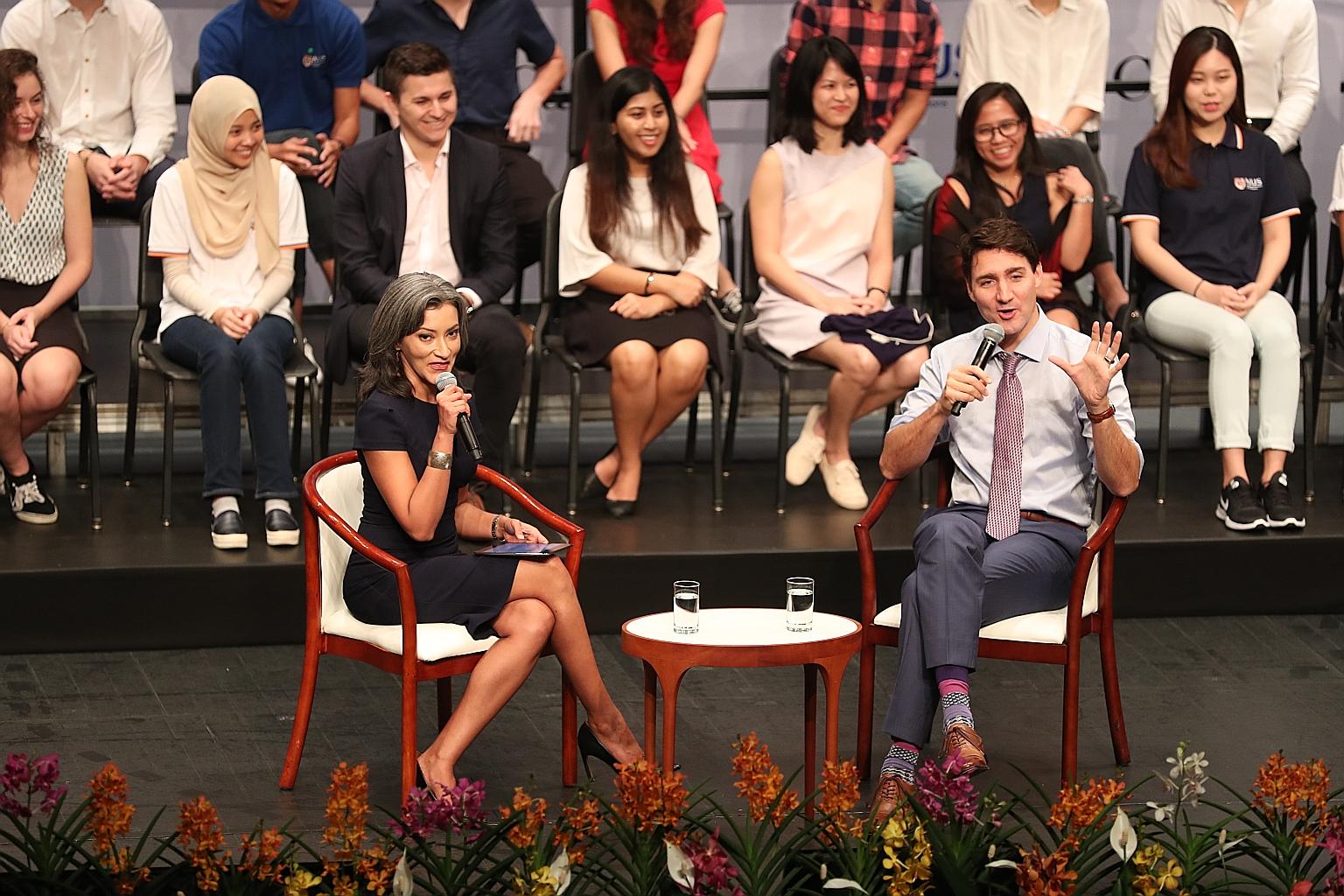33rd Asean Summit
New trilateral pact won't affect trade talks with China: Trudeau
Clause in pact with US and Mexico does not prevent Ottawa from continuing ongoing negotiations, says Canadian PM
Sign up now: Get ST's newsletters delivered to your inbox

Canadian Prime Minister Justin Trudeau and BBC presenter Sharanjit Leyl at a dialogue at the National University of Singapore yesterday. Mr Trudeau said it was a careful balancing act engaging countries on human rights issues while building a working relationship with them.
ST PHOTO: TIMOTHY DAVID
A clause that calls on signatories of the US-Mexico-Canada trade pact to notify the others if they enter trade talks with a "non-market" economy will not affect Canada's ongoing efforts to negotiate a trade deal with China.
Canadian Prime Minister Justin Trudeau made the comments when answering a question from BBC presenter Sharanjit Leyl at a dialogue held at the National University of Singapore (NUS) yesterday.
The trilateral deal known as USMCA, which replaces the North American Free Trade Agreement (Nafta), stipulates that if a member country enters a free trade deal with a non-market economy, it has to notify the others three months before negotiations begin. The other members can quit within six months to form their own bilateral trade pact.
The clause is widely seen as an attempt by the United States to restrict its partners from signing trade deals with Beijing.
Yesterday, Mr Trudeau said the clause "does not prevent (Canada) from doing anything that we are already doing" in its trade negotiations with China.
"I don't see that as really a challenge... cancelling and moving back from free trade is something that comes at a very, very heavy political and economic price," he said.
"There is an element of transparency, we have to keep our Nafta partners informed on how we are doing, which I think is only fair," said Mr Trudeau, who is in Singapore for the Asean Summit as a guest of the Asean chair.
At the event attended by about 400 NUS students and staff, Mr Trudeau also addressed concerns about whether the US' divided Congress, which recently saw Democrats take control of the House of Representatives, will approve the USMCA deal.
Noting that Canada is the top export destination for more than 30 American states, he said: "I understand there is a political context that is going to be worked through, but everyone wants to see their folk in their home town, their workers, their communities do better, and that is something that will happen with a smart trade deal like this one."
A student asked Mr Trudeau how Canada strikes a balance between working with countries to secure economic growth while speaking up for human rights, in the light of its decision last month to revoke the honorary Canadian citizenship of Myanmar's de facto leader Aung San Suu Kyi over the persecution of the Rohingya minority.
In his reply, Mr Trudeau cited China, the Philippines and Saudi Arabia.
He said he had raised the issue of China's Uighur Muslim minority during bilateral talks with China's Premier Li Keqiang on Wednesday. At the United Nations earlier this month, China had faced calls from Western governments to end the detention of Uighur Muslims in re-education camps.
Mr Trudeau added that he had brought up extrajudicial killings with Philippine President Rodrigo Duterte last year.
"He was fine in the conversation but afterwards expressed his displeasure at the way I had said those things, and it did end up with us not having a helicopter contract... because we were suddenly worried about what they might be doing with the helicopters," said Mr Trudeau, referring to the Canadian government's decision to review a multimillion-dollar agreement to sell 16 helicopters to the Philippines due to concerns that the aircraft could be used to fight rebels.
Striking a balance is certainly challenging when it comes to Saudi Arabia, he noted.
The Middle Eastern country had come under criticism for the death last month of dissident and journalist Jamal Khashoggi in the Saudi consulate in Istanbul.
It is a careful balancing act, said the Canadian leader, and Canada will always try and engage countries on these issues, while building a working relationship that allows it to nudge these countries forward on human rights issues.


